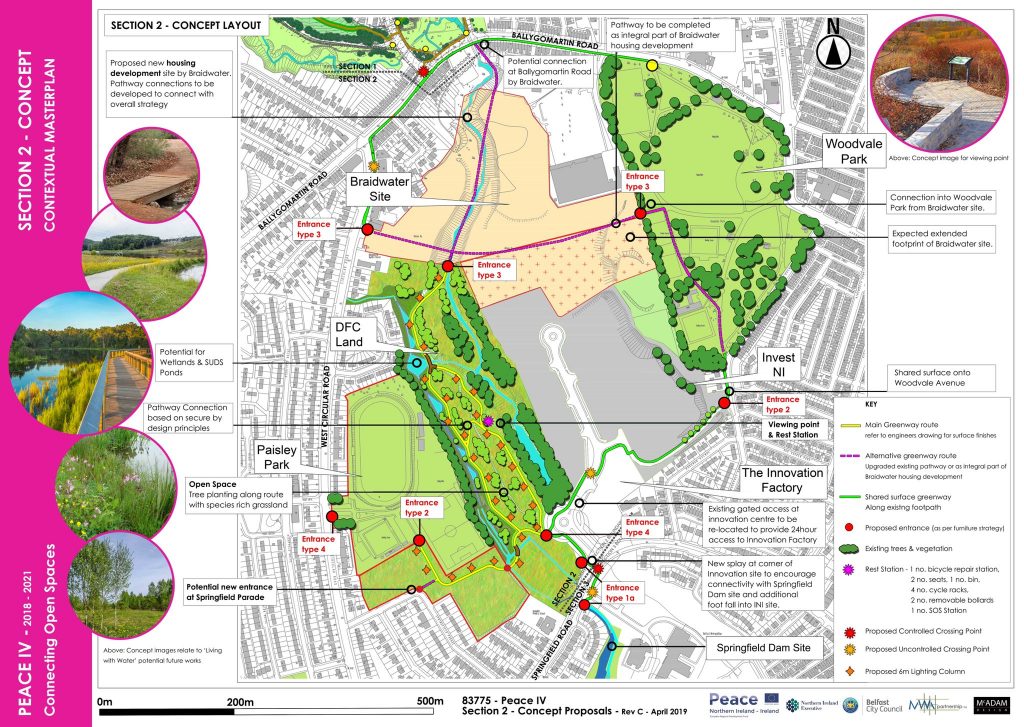A number of community planning issues have come to the fore over the last few months that have strengthened the argument for the introduction of an NI Community Rights Act.
Belfast City Council (BCC) has revealed plans for the Forth Meadow Community Greenway, a project that aims to develop green space all the way from the Woodvale area, down through a large area of west Belfast to the Springfield Road. Sounds good in principle, but, as pressure group Participation & The Practice of Rights (PPR) has maintained for over ten years now, there is dire need for housing in the Springvale area which, it appears, the BCC proposal has neither made provision for, nor sought adequate consultation for with the community.

For context, the land – known commonly as the Mackie’s site – is public land under the management of the Department for Communities (DfC), though a Derry-based property development company, the Braidwater Group, has been brought in as part of the project. So far, Braidwater has refused to disclose if it is developing private, mixed-tenure or social housing but a Freedom of Information request from PPR revealed that some land is set to be transferred between organisations involved in the proposals.
While Belfast City Council maintains that an online survey was posted on its website by way of public consultation, the survey was open to the public for just a week. Even PPR, which is very much abreast of developments in this area of the city, were only made aware of the consultation on the day of its submission deadline.
The merits of the BCC plan, of which there are potentially many, have therefore been obscured by a typically poor consultation process. Whilst green space in urban areas is certainly desirable, no proposal is without its flaws and, done correctly, a good consultation may raise cogent objections hitherto not considered. In this case, the fact that thousands of people remain on housing lists should have a significant bearing on the shaping of local space and place; but as long as community participation in planning is precluded, compromise and accommodation is not on the agenda.
Residents of Sailortown, situated at the edge of Belfast harbour, have been seeking a compromise with developers attempting to demolish their local heritage to build a tower block of private dwellings. Dubbed ‘Travesty Towers’ by Terry McKeown, Project Leader at Sailortown Regeneration Group, the development, Terry argues, will be unsympathetic to the local environs, overshadow residents and prevent the flourishing of local businesses
(hear about the Sailortown story on Good Morning Ulster – skip to 44:53).
Community rights legislation would go a long way toward a resolution in Sailortown if it were to include the right to a meaningful consultation and the right to challenge decisions i.e. a community right of appeal. As one example of just how slanted the playing field is, a private developer can appeal a council’s planning decision, but a community or individual cannot.
In mid-November, a motion to demolish Havelock House, on Belfast’s lower Ormeau Road, was unanimously defeated at a sitting of Belfast City Council. Great news for the campaigners; however, the developers have already appealed this decision, a provision that would be denied to the residents had the decision gone the other way.
The developer in this case is London-based Olympia Homes which proposes to build 270 build-to-rent apartments on the site. Objections centre around the removal of a cultural landmark (the old UTV headquarters and also a former linen warehouse), noise and dirt created by the construction works and privacy. There is the added complication that the building currently resides on an interface.
Watch the NVTV documentary Havelock House: The Future?
If the building were listed, campaigners could avoid the need to navigate the planning process altogether. This can be granted either by the Department for Communities (full listed status) or by Belfast City Council (heritage asset status). At time of writing, neither public body was willing to commit to this. Which leaves the future of Havelock House in a tug-of-war, with Olympia Homes at one end of the rope and Donegall Pass Community Forum and the Save Havelock House campaign on the other.
What these local residents have highlighted is that there are specific obstacles to participation in community planning. The gargantuan task of resisting the influence wielded by wealthy corporate interests is not made easier by a lack of legal knowledge, or simply time to do research, as well as health problems and access to digital communications. The odds are therefore stacked against this community, and every other community in NI, when they should have the right to have their voices heard in decisions that may radically change the places in which they live.
The public health crisis of 2020 has prompted a re-evaluation of the relationship between the state and people as individuals, and collectively as communities. There is now an opportunity to forge a new relationship with community rights at the core, built on transparency and accountability, consultation and engagement.